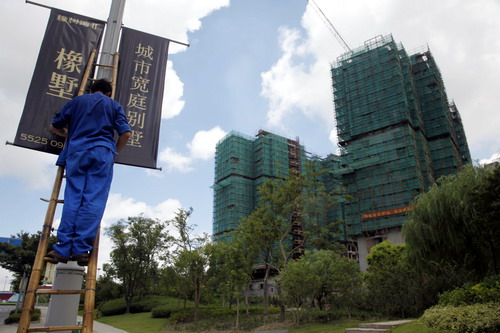Bond proceeds seep into property
Updated: 2011-11-25 09:22
By Henry Sanderson (China Daily)
|
|||||||||
|
 A man erects an advertisement for an upcoming housing project on the outskirts of Shanghai. Nearly 60 percent of companies that filed bond prospectuses since May have invested in the property market. [Photo/ Bloomberg] |
BEIJING - Almost 60 percent of the Chinese companies that sold bonds in the past six months invested in the property market, undermining government efforts to limit real estate fundraising and curb inflation.
Out of 121 companies that filed bond prospectuses since May with clearinghouse Chinabond, 74 count one of their main businesses as real estate, have property subsidiaries or invest in the market.
While property values fell in 33 of 70 cities in October, the most in 2011, home prices rose 2.9 percent in the past year in Shanghai and 4.4 percent in Shenzhen.
Premier Wen Jiabao said last month that the government should maintain measures to cool the market that have pushed developers' shares down 15.4 percent this year. Company borrowing costs fell to a 10-month low in November as average yields globally rose.
"Some corporates, even if they have some relationship with property investment, can still get money," Xu Xiaoqing, the head of fixed-income research at China International Capital Corp said in a phone interview from Shanghai on Tuesday. "They can raise the money in the name of other uses."
Property investment growth, the most important driver of Chinese fixed-asset investment, is expected to "fall sharply" in 2012, Credit Suisse Group AG said in a Monday report. Nationwide prices declined for a second month in October, down 0.23 percent, according to SouFun Holdings Ltd, a website operator for real estate in China.
"Regulators are determined to control the fund flow to the sector," Bei Fu, a Hong Kong-based analyst at Standard & Poor's said in a Tuesday interview. "The property market has really had a good time in the last decade or so, so a lot of companies including a lot of State-owned enterprises are into this business."
Zhejiang Geely Holding Group Co's main business, apart from the production of cars, includes "property investment", according to a prospectus for a bond sold on June 20.
"When you raise the money for a bond you are told the use of the capital but we cannot monitor the use," Xu said.
Yields on Poly Real Estate Group Co's 4.3 billion yuan ($677 million) in 2012 bonds rose to a record 8 percent on Sept 30, according to exchange data. The yield on developer Xinhu Zhongbao Co's 1.4 billion yuan 2016 note climbed to an all-time high of 8.9 percent on Sept 29, exchange data show.
Yields on Chinese corporate bonds dropped 50 basis points this month to a 10-month low of 5.162 percent on Nov 15, according to Bank of America Merrill Lynch indices. Average yields on company bonds globally gained 5 basis points in the period, the indices show.
The cost of insuring Chinese sovereign bonds against non-payment has more than doubled this year with five-year credit-default swaps increasing 37 basis points this month to 165 basis points on Wednesday, according to data provider CMA, which is owned by CME Group Inc and compiles prices quoted by dealers in the privately negotiated market.
The contracts pay the buyer face value in exchange for the underlying securities or the cash equivalent should a government or company fail to adhere to its debt agreements.
The yuan has advanced 3.8 percent this year, the best performance among Asia's 10 most-traded currencies, excluding the yen. Twelve-month non-deliverable forwards fell 0.12 percent to 6.3880 a dollar, a 0.4 discount to the onshore rate.
Out of 499 issuers that have provided 2010 financial statements, 122 explicitly state property or land management as part of their main businesses, HSBC Holdings PLC wrote in a November report.
"We think that revenues from property are significant enough to suggest that the property exposure of banks' loan books is understated by companies," HSBC analysts led by Yi Hu wrote.
The government should "firmly" maintain property market curbs, and local authorities should strictly implement them so that the Chinese people could see the effects in coming months, according to a government statement following a State Council meeting chaired by Wen on Oct 29.
Bloomberg News










